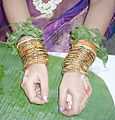Valaikaapu
Valaikaapu [1] is a laukika (Sanskrit for worldly, non-religious) ceremony and celebration held by Hindu, Muslim and Christian women in Tamil Nadu, meant to bless a pregnant woman, celebrate her fertility, and ensure a safe birth. It is hosted by the pregnant woman's mother and father to be home during the third trimester of the pregnancy.[2] . Hindu women will be worn with bangles in both the hands in odd numbers. It is believed that the bangle sound induces the child's senses[3] The women put red and green glass bangles on the mother-to-be’s wrists, sing hymns and songs and put vermilion on her forehead. The woman then rests at her parents' home for the final weeks of her pregnancy.
The purpose of the ceremony is to honour and protect the pregnant woman, who is seen as vulnerable to the evil eye, malign spirits and ghosts, and to ensure the birth of a healthy child. Valaikaapu was originally a simple ceremony, mainly limited to the exchange of bangles. But as valaikaapu became more widely practiced, it grew more lavish, and since the 1980s has been celebrated by most, according to anthropologists who have studied the practice, with "magnificence and sumptuousness," with gifts including jewellery, saris, household appliances, mobile phones and gold ornaments.[4]
Similar ceremonies are held in other parts of India and in Pakistan, including among Bengali women, Marathi and Konkani women (who call the ceremony Dohale Jevan [डोहाळे जेवण]), Punjabi women (who call it Godh-Bharai), Sindhi women, and Marwari women.[5]
| Wikimedia Commons has media related to Valaikaapu. |
Gallery
-

Valaikaapu ceremony
-

Bangles on ValaiKaappu
-

Bangles on ValaiKaappu
References
- ↑ Stone, ed.: Helaine Selin ; co-ed. Pamela K. (2009). Childbirth across cultures : ideas and practices of pregnancy, childbirth and the postpartum. Dordrecht [etc.]: Springer. p. 100. ISBN 9048125987.
- ↑ Stone, ed.: Helaine Selin ; co-ed. Pamela K. (2009). Childbirth across cultures : ideas and practices of pregnancy, childbirth and the postpartum. Dordrecht [etc.]: Springer. p. 100. ISBN 9048125987.
- ↑ Stone, ed.: Helaine Selin ; co-ed. Pamela K. (2009). Childbirth across cultures : ideas and practices of pregnancy, childbirth and the postpartum. Dordrecht [etc.]: Springer. p. 102. ISBN 9048125987.
- ↑ Petitet, Pascale Hancart; Pragathi Vellore (2007). "Ethnographical views on valaikappu. A pregnancy rite in Tamil Nadu". Indian Anthropologist 37 (1): 117–145. Retrieved 2 August 2012.
- ↑ Soundar, Chitra (2003). Gateway to Indian culture (2nd ed. (revised). ed.). Singapore: Asiapac Books. p. 70. ISBN 9812293272.